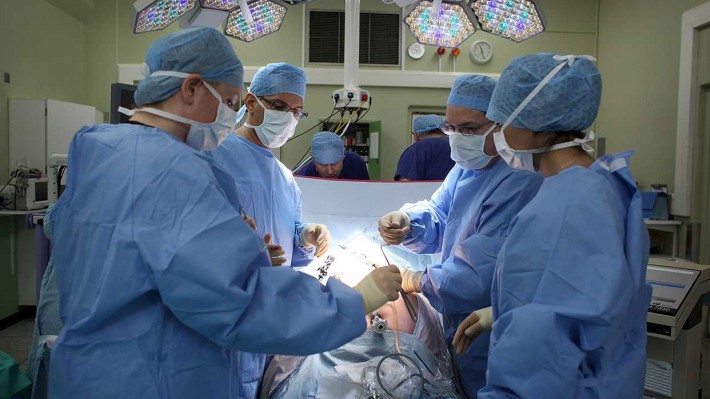Overseas patients owe NHS £30m
Trusts struggling to recoup cost of services such as maternity care and general medicine, says FOI data

A free daily email with the biggest news stories of the day – and the best features from TheWeek.com
You are now subscribed
Your newsletter sign-up was successful
NHS trusts around the country are owed around £30m by overseas patients who have used the UK's health service this year.
Data obtained from 104 trusts under the Freedom of Information (FOI) Act show that in 2015/2016, foreign visitors racked up £29,530,378 in unpaid medical bills.
Maternity care as well as general medicine accounted for a large proportion of the services provided to patients ineligible for free NHS treatment.
The Week
Escape your echo chamber. Get the facts behind the news, plus analysis from multiple perspectives.

Sign up for The Week's Free Newsletters
From our morning news briefing to a weekly Good News Newsletter, get the best of The Week delivered directly to your inbox.
From our morning news briefing to a weekly Good News Newsletter, get the best of The Week delivered directly to your inbox.
Under a reciprocal agreement within the European Economic Area (EEA), the NHS forwards the bill for medical care provided to EEA citizens to their home government, which automatically pays the debt.
However, for non-EEA citizens, it is up to individual trusts to claim back the money and the figures suggest many are struggling do so.
A recent report from the National Audit Office (NAO) revealed only half of non-EEA patients pay their NHS bill.
Ninety-two of the 104 trusts who responded to the FOI request also provided data for last year, when £15,907,018 was unpaid, suggesting the overall total would fall short of this year's £29.5m.
A free daily email with the biggest news stories of the day – and the best features from TheWeek.com
"The true amount owed could be far higher as the figure does not include overseas patients who are never asked to pay - for example those who can provide a UK address," Sky News adds.
London hospitals were owed the most, with eight hospitals chasing more than £1m of unpaid bills. Guy's & St Thomas' NHS Foundation Trust and London North West Healthcare NHS Trust "owed about £5m each for the past four years", The Times reports.
Katherine Murphy, the chief executive of the Patients Association lobbying group, said it was understandable that UK-based residents have expressed "very strong feelings" about overseas visitors using the NHS.
She added: "If this money was reinvested in the NHS, it could mean the difference between hiring more nurses or paying for additional equipment."
However, British Medical Association chairman Dr Mark Porter told the Daily Telegraph that any system to recoup the costs "must not jeopardise access to healthcare for those who need it".
He said: "A doctor's duty is to treat the patient in front of them, not to act as a border guard."
-
 How the FCC’s ‘equal time’ rule works
How the FCC’s ‘equal time’ rule worksIn the Spotlight The law is at the heart of the Colbert-CBS conflict
-
 What is the endgame in the DHS shutdown?
What is the endgame in the DHS shutdown?Today’s Big Question Democrats want to rein in ICE’s immigration crackdown
-
 ‘Poor time management isn’t just an inconvenience’
‘Poor time management isn’t just an inconvenience’Instant Opinion Opinion, comment and editorials of the day
-
 A real head scratcher: how scabies returned to the UK
A real head scratcher: how scabies returned to the UKThe Explainer The ‘Victorian-era’ condition is on the rise in the UK, and experts aren’t sure why
-
 How dangerous is the ‘K’ strain super-flu?
How dangerous is the ‘K’ strain super-flu?The Explainer Surge in cases of new variant H3N2 flu in UK and around the world
-
 The ‘menopause gold rush’
The ‘menopause gold rush’Under the Radar Women vulnerable to misinformation and marketing of ‘unregulated’ products
-
 How the care industry came to rely on migrant workers
How the care industry came to rely on migrant workersThe Explainer Government crackdown on recruiting workers abroad risks deepening care sector crisis, industry leaders warn
-
 Could medics' misgivings spell the end of the assisted dying bill?
Could medics' misgivings spell the end of the assisted dying bill?Today's Big Question The Royal College of Psychiatrists has identified 'serious concerns' with the landmark bill – and MPs are taking notice
-
 Washwood Heath: Birmingham's pioneering neighbourhood health service
Washwood Heath: Birmingham's pioneering neighbourhood health serviceIn the Spotlight NHS England chair says there is a 'really good argument this is the model for the future'
-
 The UK's first legal drug consumption room
The UK's first legal drug consumption roomThe Explainer 'Potentially transformative moment in UK drugs policy' as The Thistle opens in Glasgow
-
 How can the UK solve the adult social care crisis?
How can the UK solve the adult social care crisis?Today's Big Question New commission announced to turn our buckling care sector around: yet more delay or finally a way forward?